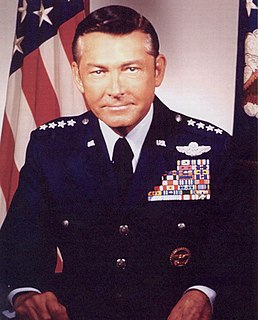A Quote by Epictetus
It is our attitude toward events, not events themselves, which we can control. Nothing is by its own nature calamitous -- even death is terrible only if we fear it.
Related Quotes
This is not remarkable, for, as we know, reality is not a function of the event as event, but of the relationship of that event to past, and future, events. We seem here to have a paradox: that the reality of an event, which is not real in itself, arises from the other events which, likewise, in themselves are not real. But this only affirms what we must affirm: that direction is all. And only as we realize this do we live, for our own identity is dependent upon this principal.
Many people believe that decentralization means loss of control. That's simply not true. You can improve control if you look at control as the control of events and not people. Then, the more people you have controlling events - the more people you have that care about controlling the events, the more people you have proactively working to create favorable events - the more control you have within the organization, by definition.
It is so important to remember that, as we travel through life, there will be so many events which we can`t control. These are things that seemingly alter our lives forever or become barriers for living a life of fulfillment. It`s important to remember that the ultimate experience of life is not to be controlled by events. We all have difficult events in our lives - the loss of family members, economics, stress, litigation, government interference in our businesses, health challenges. Remember that it is not the events that shape our lives, but, rather, the meaning we attach to them.
You could ask: Why are people attracted to narratives that justify the terrible things that we're doing to the planet? Why are people attracted to narratives of control and fear and hunting down the terrorists, and this uncaring attitude toward nature? These come from what I call the perceptions of separation and the experience of separation, the experience of alienation, the experience of scarcity and anxiety and competition, and a world in which everybody is out for themselves and nobody cares.
Let the children learn to see in nature an expression of the love and the wisdom of God; let the thought of Him be linked with bird and flower and tree; let all things seen become to them the interpreters of the unseen, and all the events of life be a means of divine teaching. As they learn thus to study the lessons in all created things and in all life's experiences, show that the same laws which govern the things of nature and the events of life are to control us, that they are given for our good, and that only in obedience to them can we find true happiness and success.
Tragedy is an imitation not only of a complete action, but of events inspiring fear and pity. Such an effect is best produced when the events come on us by surprise; and the effect is heightened when, at the same time, they follow as cause and effect. The tragic wonder will then be great than if they happened of themselves or by accident; for even coincidences are most striking when they have an air of design.
News has a way of distancing us from events, even as it informs us about them. News articles almost always present both the event and the responses at the same time - how is President Barack Obama or Congress responding to the events? I think this reflects a deep need we have to feel that things are under control and that events are subject to our influence.







































